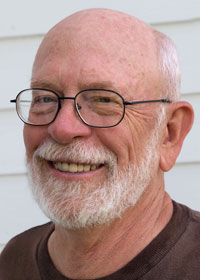|
 |
| Roy Christman is a retired political science professor and has a farm in Pennsylvania. |
| |
| |
| |
| |
|
|
Consider life without electricity. The Amish may accept an electricity-free existence, but at breakfast I want cold milk for my GrapeNuts. I need my lamp for bedtime reading. I occasionally watch a movie on TCM. How would I keep the water in the chicken coop from freezing in the winter? I certainly didn't type this on an old manual Underwood.
It is quite possible that "California Update" readers would find a lack of electricity not only inconvenient, but in some cases life-threatening. We can give up booze or nicotine, but we really cannot go cold turkey on electricity.
Luckily electricity can be produced by a variety of ways. Unfortunately some of the generating methods have major drawbacks, increasing air and water pollution and contributing to global climate change. While decentralized production, or "soft energy," would eliminate the necessity of a large capital investment, a centralized production facility, and a grid to deliver the power (think solar panels on your house roof), for most of us that is either impractical or impossible.
Recently an energy company proposed erecting a solar array on a fallow farm in the neighboring county. The local government held a public hearing, and the room was packed. Keep in mind, that solar array would produce no smoke (unlike coal-fired plants), result in no long-term toxic waste (unlike nuclear and coal-fired plants), and would not require in a large impervious area resulting in increased run-off. The main objection seemed to be that the solar facility "would look ugly." Compared to the suburban-style homes that spring up on vacant farmland, solar panels are a step up.
About three years ago a local municipal water authority contracted with a Spanish energy firm to build electricity-producing windmills in its reservoir watershed. Again local residents, many of them rather well-off, were enraged. Lawyers were hired, meetings were held, and people who let their cats run wild now discovered that bird life might be disrupted. The Spanish firm eventually withdrew its offer.
|
This does not mean I favor all electricity-generating plants. I am a member of a local environmental group fighting a proposal to burn waste coal and tire shreds to produce power to run the computers used for "bitcoin mining." Not only is the plant next to a town of low income residents but it will also emit dangerous chemicals and particulates. I might also note the world is not desperately crying out for cryptocurrency.
To sum up, almost all of us need electrical power, most of us will tie into a grid, and some production methods are less harmful than others. We need to oppose the worst and support the better.
- Here's my take:
Geothermal: What's not to like? The problem is that only a small portion of the globe has usable geothermal sources.
Hydro: If you need to build large dams, this is not a good source. On the other hand, small scale "mini-hydro"plants can work well.
Solar: The more homes that switch to roof-top solar panels, the better, but even large arrays do not generate air pollution.
Windmills: I love them marching across West Texas. Also, in spite of what opponents sometimes claim, they don't affect whales.
Nuclear: We still haven't figured out what to do with the waste, and there was that incident on Three Mile Island, but I'd rank this above coal-fired plants.
Coal: The strip mines are a disaster, the air pollution is significant, and the waste products creates all kinds of problems.
Coal and tire shreds: Who came up with this idea?
Maybe I'll re-evaluate the Amish life.
~ Roy Christman
|
